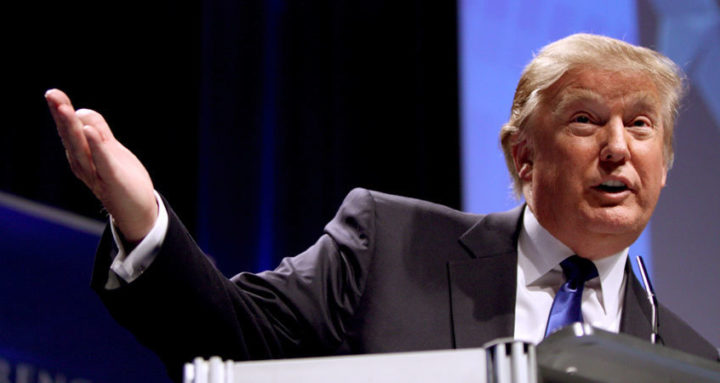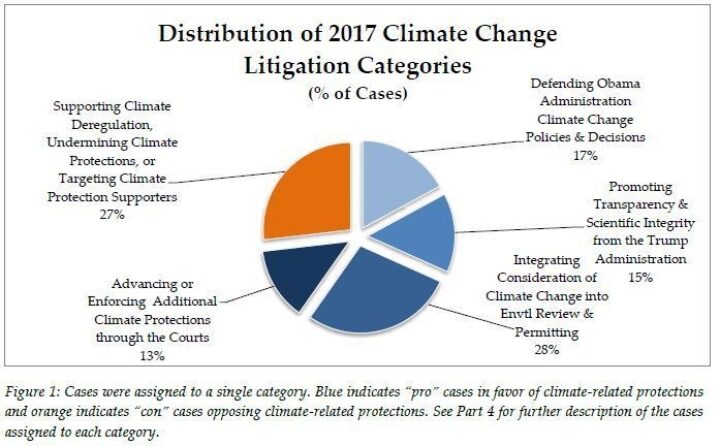US climate change litigation in the age of Trump
Administration’s efforts to deregulate climate change have met with constant resistance, study finds
By George Smeeton
Share
Last updated:
Donald Trump claims to have delivered on deregulation in his first year as President. While independent reporting questions the veracity of his assertions, climate change is one arena where the Trump Administration’s regulatory rollbacks have been both visible and real.

The Administration has delayed and initiated the reversal of rules that reduce greenhouse gas (GHG) emissions from stationary and mobile sources; sought to expedite fossil fuel development, including in previously protected areas; delayed or reversed energy efficiency standards; undermined consideration of climate change in environmental review; and hindered adaptation to the impacts of climate change.
In total, the Sabin Center’s U.S. Climate Deregulation Tracker identifies a total of 64 actions taken by the executive branch in 2017 to deregulate climate change. These actions correspond to at least two dozen climate-related protections. However, the Trump Administration’s efforts have met with constant resistance, with those committed to climate protections bringing legal challenges to many, if not most, of the rollbacks.
U.S. Climate Change Litigation in the Age of Trump: Year One—a new working paper by the Sabin Center for Climate Change Law at Columbia Law School—seeks to give shape to the current moment in climate change litigation, categorising and reviewing dozens of climate change cases filed during 2017 to understand how litigation countered—and at times courted—the influx of climate change deregulation during the first year of the Trump Administration. (An Executive Summary is also available.)
The analysis focuses specifically on 82 “climate change cases,” defined as cases that raise climate change as an issue of fact or law. To explain the effects of climate change litigation in 2017, this paper sorted cases into five categories:
- Defending Obama Administration Climate Change Policies & Decisions;
- Demanding Transparency & Scientific Integrity from the Trump Administration;
- Integrating Consideration of Climate Change into Environmental Review & Permitting;
- Advancing or Enforcing Additional Climate Protections through the Courts; and
- Deregulating Climate Change, Undermining Climate Protections, or Targeting Climate Protection Supporters.
The first four categories are “pro” climate protection cases—if their plaintiffs or petitioners are successful they will uphold or advance climate change protections. The fifth category contains “con” cases—if their filing party or parties are successful, these cases will undermine climate protection or support climate policy deregulation. 60 of the reviewed cases were pro climate protection and 22 were con. The pro cases outweigh the con cases roughly 3:1 (73% to 27%).

Report Highlights:
- Direct Defense of Obama Administration Climate Policies Is Supplemented by a Wide Range of Other Lawsuits Supporting Climate Protection: 14 of the 60 pro climate cases (23%) concerned “Defending Obama Administration Climate Change Policies and Decisions.” The other 46 pro cases concerned transparency, environmental review and permitting, or advancing other climate protections. These cases reflect existing trends in climate change litigation, such as enforcing obligations to consider climate change effects under the National Environmental Policy Act (NEPA). They also indicate new developments, such as a surge of municipalities suing fossil fuel companies under state common law and a suite of Freedom of Information Act (FOIA) lawsuits seeking transparency from the Trump Administration.
- About a Quarter of Cases Worked in Favour of Climate Policy Deregulation: Additionally, a little more than a quarter (27%) of reviewed cases advanced climate change deregulation, undermined climate protections, or attacked supporters of climate protections. These challenges ranged from petitions to review Obama Administration climate rules to contestations over state-level denials of environmental permits for fossil fuel infrastructure to a defamation action against critics of the fossil fuel industry.
- The Courts Struck Down Illegal Delays and Litigation Pressured Publication of Withheld Rules; Among Cases in the Data Set, No Climate Policy Rollbacks Were Upheld on the Merits in 2017: Of the 14 cases directly defending Obama Administration climate change policies and decisions, six reached some form of resolution by February 1, 2018. Federal courts found both an administrative delay and a compliance postponement to be illegal. Another administrative delay case was voluntarily dismissed after the stay terminated and the agency withdrew its plans to delay the rule. Three cases pressured publication of two delayed rules by the relevant agencies (two cases concerned the same rule). Each of these six cases concerned delay of climate policies; none of the climate change cases concerning a revocation or implementation of new deregulatory practices had advanced to judicial or other resolution by the end of 2017. (Since the release of the report, the courts have found another delay from the Trump Administration to be illegal. This delay concerned a failure to put energy efficiency standards for portable air conditioners and other products into effect.)
- NGOs, Sub-National Governments, and Industry Actors Were Far and Away the Most Frequent Plaintiffs and Petitioners:
- Pro cases brought by NGOs represent more than half (43/82 cases or 52%) of the reviewed climate change litigation. Looking within the pro category, NGOs brought 72% of the pro litigation items. Municipal, state, and tribal government entities were plaintiffs or petitioners in 28% of pro cases, including actions from more than a dozen states.
- Industry actors, (primarily private companies and trade groups), brought 20% of total cases and 68% of con cases. These numbers do not include conservative think tanks closely aligned with industry interests—such groups participated in 6/7 of the con NGO cases or 27% of con cases.
- The Environmental Protection Agency (EPA) and the Department of the Interior (DOI) Were the Most Frequent Defendants: The federal government is the defendant in a vast majority of cases (78% of reviewed cases filed in 2017, see Part 3 of the report for details on this figure). While more than a dozen federal entities were sued, more than half (55%) of the climate cases filed against federal defendants in 2017 challenged the DOI, EPA, their respective sub-entities, or their officials.
- Claims Employed a Variety of Laws with Frequent Use of Environmental Statutes: Claims fell under a variety of administrative, statutory, constitutional, and common law. Forty-two cases involved environmental statutes and at least one of four major environmental statutes—the Clean Air Act (CAA), the Clean Water Act (CWA), the Endangered Species Act (ESA), and NEPA—played a role in 41/42 of the cases involving environmental law. 36 cases involved the Administrative Procedure Act and another 14 involved FOIA.
Though courts have issued a few decisions and litigation has pressured agencies to publish some outstanding rules, the “stickiness” of these outcomes remains uncertain. Neither of these results preclude an agency from subsequently rolling back the policies at issue through the rulemaking process. Already, agencies have initiated the regulatory repeal process for several rules. As the regulatory process progresses in 2018, more climate change litigation will likely seek to enforce the substantive judicial standards for deregulation. Meanwhile, lawsuits challenging delays will keep policies in effect during the months or years it takes to complete regulatory repeals and prevent any illegal rollbacks from establishing new precedent.
See the Full Report for further details.
Dena Adler is Climate Law Fellow at the Sabin Center for Climate Change Law, Columbia Law School. A version of this blog post was originally published by the Sabin Center’s Climate Law Blog
Share